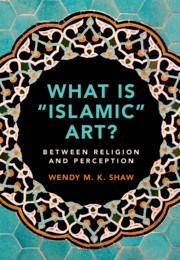Book contents
- What is “Islamic” Art?
- What is “Islamic” Art?
- Copyright page
- Epigraph
- Contents
- Figures
- Color Plates
- Preface
- Note on Transcultural Communication
- Introduction From Islamic Art to Perceptual Culture
- 1 The Islamic Image
- Chapter 2 Seeing with the Ear
- Chapter 3 The Insufficient Image
- Chapter 4 Seeing with the Heart
- Chapter 5 Seeing through the Mirror
- Chapter 6 Deceiving Deception
- Chapter 7 The Transcendent Image
- Chapter 8 The Transgressive Image
- Chapter 9 Mimetic Geometries
- Chapter 10 Perspectives on Perspective
- Conclusion Out of Perspective
- References
- Index
- Plate Section (PDF Only)
Chapter 3 - The Insufficient Image
Published online by Cambridge University Press: 27 September 2019
- What is “Islamic” Art?
- What is “Islamic” Art?
- Copyright page
- Epigraph
- Contents
- Figures
- Color Plates
- Preface
- Note on Transcultural Communication
- Introduction From Islamic Art to Perceptual Culture
- 1 The Islamic Image
- Chapter 2 Seeing with the Ear
- Chapter 3 The Insufficient Image
- Chapter 4 Seeing with the Heart
- Chapter 5 Seeing through the Mirror
- Chapter 6 Deceiving Deception
- Chapter 7 The Transcendent Image
- Chapter 8 The Transgressive Image
- Chapter 9 Mimetic Geometries
- Chapter 10 Perspectives on Perspective
- Conclusion Out of Perspective
- References
- Index
- Plate Section (PDF Only)
Summary
Chapter 3 examines discussions about the mimetic possibilities of musical and visual images as reflected in late twelfth-century Persian-language epic poetry, focusing on intertextual and intermedial commentaries on philosophical discourses. Focusing on the narration and a sixteenth-century Mughal painting of a story about Plato as a musician in of the Iskandarnamah (1194) of Nizami of Ganj, the chapter argues that poetry served as a popularizing vehicle for Platonic thought consciously engaged at multiple moments in Islamic intellectual history. Painting augmented this discourse, enabling complex references to other texts including the fabular Kalila and Dimna and The Language of the Birds (1177) by Farid al-Din Attar. Delving into the poetry referenced through visual cues in the painting, the chapter reveals powerful currents of Platonic thought traced through Plotinus, the Brethren of Purity, ibn Sina, and the mystic Suhrawardi into the popular epic work by Attar. The analysis suggests that the mythic Simurgh central to the Language of the Birds incorporates complex Platonic symbolism into Islam, with strong implications about the limits and possibilities of representation. The intimacy of the poetry with Platonic thought suggests that far from inimical, philosophy and Islamic discourses may be indivisible.
Keywords
- Type
- Chapter
- Information
- What is 'Islamic' Art?Between Religion and Perception, pp. 79 - 103Publisher: Cambridge University PressPrint publication year: 2019

